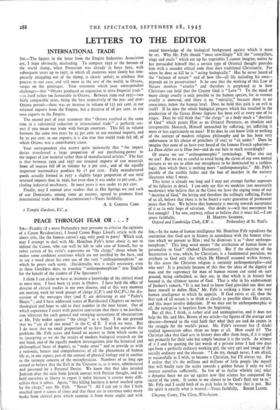SIR,—In the name of human intelligence Mr. Hamilton Fyfe repudiates
the contention that God acts in history in accordance with the human situa- tion which we present to Him ; and he dismisses it as " sheer anthropo- morphism." This long word means " the attribution of human form or personality to God " (Oxford Dictionary). But if the doctrine of the Incarnation is true, which, for Christians, is a fundamental postulate, we attribute to God only that which He Himself assumed within history. In this sense the Christian religion is certainly anthropomorphic—and why not? It is precisely because of this that the ideas of the dignity of man and the supremacy for man of human reason can stand on sure ground, being embedded, as they are, in that which is in history but beyond it, the ultimate nature of God. That is why in his endorsement of Joubert's remark, " It is not hard to know God provided one does not force oneself to define Him," Mr. Fyfe is striking a blow at the very human intelligence to which he appeals. If God exists at all,' then the first task of all reason is to think as clearly as possible about His nature, and this must involve definition. If we may not be anthropomorphic at all, the enterprise is hopeless from the beginning. 1 But all this, I think, is rather arid and unimaginative, and it does not 1
help the Mr. and Mrs. Brown of my article—lay figures of the average and obscure—forward to the vital faith that what they are and do counts in the struggle for the world's peace. Mr. Fyfe's reverent but (I think) studied agnosticism offers them no hope at all. How could it? The Christian idea that God acts in history does offer them hope, if it is urged not primarily for their sake but simply because it is the truth. As witness of it I end by quoting the last words of a private letter I had two days ago from a perfectly ordinary working girl, the very spit and image of the socially ordinary and the obscure. " I do try, though never, I am afraid, as successfully as I wish, to become a Christian, but I'll always try. For I realise that it's the millions and millions of little people like myself that will finally turn the scales towards a golden future if only we will interest ourselves sufficiently. So few of us fealise wholely (sic) what a dynamic force we are up against now that science has conquered the secret of the atom. It seems to me almost to be God's final test to us." Mr. Fyfe and I could both of us pick holes in the way that is put. But the spirit is exactly what is wanted.—Yours faithfully, ROGER LLOYD. a Cheyney Court, The Close, Winchester. a


























 Previous page
Previous page